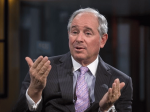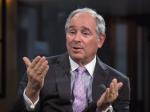Thomson Reuters
Blackstone Group CEO Steve Schwarzman rose through Ivy League schools and the US Army Reserves to become one of the top bankers at Lehman Brothers at the beginning of Wall Street's leveraged buyout boom.
He went on to launch Blackstone in 1985. The investment firm today manages more than $300 billion in assets.
Blackstone has emerged as by far the biggest private equity firm in the industry and Schwarzman, as CEO, has become the richest private-equity executive on Wall Street.
Schwarzman has put his considerable wealth behind major philanthropic endeavors. He has made sizeable donations to his undergraduate alma mater, Yale, and to the Archdiocese of New York's Inner-City Scholarship Fund.
Early next year, he will also become co-chair of the Partnership for New York City, a nonprofit group of top CEOs that works with government and charity causes to benefit the five boroughs.
Business Insider visited Blackstone's headquarters in New York and spoke with Schwarzman at length about his earliest days as an investor, how the private equity industry has evolved and what will happen when the Federal Reserve raises rates.
Here's what he had to say:
Schwarzman has a simple rule for investing - and it has generated billions in returnREUTERS/Mike TheilerQ: What advice would you give to someone looking to break into finance and private equity?
A: I’ve learned that all investments have risk. One of the rules I’ve learned is that struggling to try and think your way into making an investment is usually the best way to not have a great outcome.
The best investments are the easiest ones to approve. Ironically, when a bunch of very smart people are sitting around a table for hours trying to figure out whether they should do something, that tends to not necessarily lead to the best results. As they struggle to figure out, should we, or shouldn’t we. The investments where people walk in and the sense is, ‘well, this looks absolutely terrific, let’s do it,’ those investments are almost always quite successful.
Occasionally there’s some odd series of exceptionally low probability events that creates a less successful investment than you were expecting. But you should be able to engineer out most of that risk.
The deal that got away was an '$8 billion mistake'Getty/Mario Tama
Q: Tell us about 'the deal that got away.'
A: For me, it was buying a 20% stake in Bloomberg. A very close friend of mine from Lehman Brothers was on Mike’s board. They needed capital near the beginning of the firm.
Mike wanted to have a partner; his definition of a partner was someone who never sold. He never wanted to sell. I told him we had a fund that could last for up to 12 years, after that we’d need some liquidity.
He said, "Well, I don’t want to spend my time trying to deal with your problems. I just want a partner, and you’re my partner of choice."
I told him, "We’d love to do this, because you’re terrific, but I legally am prohibited." So he said, "That’s your problem, not my problem."
It wasn’t a mistake in the sense in that his objectives were clear. Getting into a situation there’s no way out was not permissible. That was probably an $8 billion mistake. Every time I see Mike, I think to myself, how stupid am I? I might as well be trapped [in the deal] for $8 billion. It makes me sad every time I see him.
It’s now been 30 years later, he still hasn’t sold. I guess, retrospectively, I’d still make the same mistake.
A shake-up is coming to private equityWikimedia Commons
Q: Many state pensions have been talking about slimming down the number of PE firms they commit to (even though they're investing more with the funds they are involved with). What are the potential long-term impacts from this?
A: This trend in no way surprises me. As private equity started to become an asset class, individual institutions appeared from the GP side to be more in the sampling mode. They gave money to a lot of different managers without necessarily understanding what the performance was, or was likely to be.
They all obviously had a view, which of course, like most investment programs, didn’t necessarily turn out exactly the way they anticipated. What they’ve done is something quite rational: they’re getting rid of their underperformers.
They’re increasing their exposure to the asset class, which on balance has been their best asset class. They’re concentrating more money in fewer hands. For Blackstone, in particular, this has been terrific outcome for us because of our performance across the board. We’re the only firm that’s in all these alternative asset classes with the exception of venture. We get hugely disproportionate cash flows from institutional investors … state pensions, SWFs (sovereign wealth funds).
Carried interest taxation gets too much attention in WashingtonWikimedia Commons
Q: What is the potential impact or fallout from discussions being had today by Presidential candidates regarding a change to the carried-interest tax rate?
Carried interest is a relatively small number in terms of the federal budget. It’s taken an outsized political position.
Virtually every candidate has talked about tax reform. I think tax reform’s a great idea. But if we’re going to do tax reform, it should be with the objective of driving rates as absolutely as low as we can.
You could potentially get rid of all preferences. This is not a carried interest argument. But the lower you make tax rates, the more exclusions are eliminated. You’ll have a much more fair, easily understandable set of tax policies for the country.
I think that would be a great thing. The idea of just playing with a few different areas will not accomplish that objective. I think the bolder, the better, as long as you drive those rates super low. In every economy that’s done this, their economy got better.
Blackstone is now the 'the largest owner of real estate in the world'Flickr / David
Q: Blackstone has built itself into a dominant player in the real estate business. Tell us about how that developed.
A: We started in 1985 we made our first real estate investment in 1992. We saw our first fund in 1993. So by the time we got to real estate we had already been in the M&A advisory business, the private equity business, the restructuring advisory business, and the fund of funds business. Real estate was our fifth business at the firm.
We’re now we believe the largest owner of real estate in the world. We have a performance record that is… pretty much in a league of our own, we’ve compounded around 18% after fees. We’ve had almost no losses of any type.
We clearly have become the reference institution in real estate investing business; we’re very prudent, we’re very careful, we’ve done an excellent job of figuring out cycles and doing it geographically and in different asset classes within real estate.
We’ve expanded from the opportunity real estate business to mezzanine in real estate, to senior debt in real estate. It’s been a wonderful thing with great leadership over a 23 year period.
See the rest of the story at Business Insider
See Also:









